#p: jimmy carter
Explore tagged Tumblr posts
Text
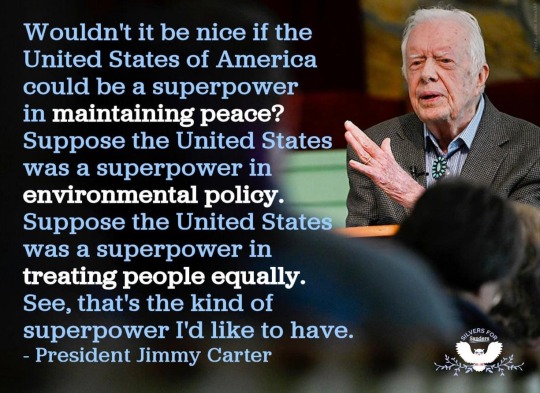
Rest In Peace, President Jimmy Carter. 💙
#jimmy carter#president jimmy carter#us presidents#rest in peace#rest in power#in memoriam#humanitarianism#us politics#p: jimmy carter#2k
5K notes
·
View notes
Text
absolutely despicable that trump wants to fly the flag at full mast for his inauguration. Jimmy Carter died, after 100 years of service to this country and the law states that when a former president dies the flag is at half mast for thirty days. It shows his true disrespect for this country and our laws. He only cares about himself. This might not seem like a big deal but it shows even more that he thinks he is above the law and can do whatever he wants to make himself look better. And that is not a good thing for someone with that much power over the law
#donald trump#yeah I’m pissed#I’m pretty patriotic#While understanding my country’s problems#I still love my country#And this is disgusting#jimmy carter#america#us politics#p-24f
389 notes
·
View notes
Text
Jimmy Carter in 2007. This is the man who brokered the most important peace deal in Israel's history. Israel's existence as an apartheid state isn't new. It isn't some "Communists in College don't know history" talking point bullshit.
As Carter says, Americans don't know this because they don't want to know. We've been able to ignore and look past the Apartheid because it was just too easy for us not to look.
It has only grown worse in the past 17 years.
574 notes
·
View notes
Text
youtube
#p diddy#youtube#jimmy carter#alternative#billford#free palestine#us politics#artists on tumblr#my ocs#realstreetradar
3 notes
·
View notes
Text
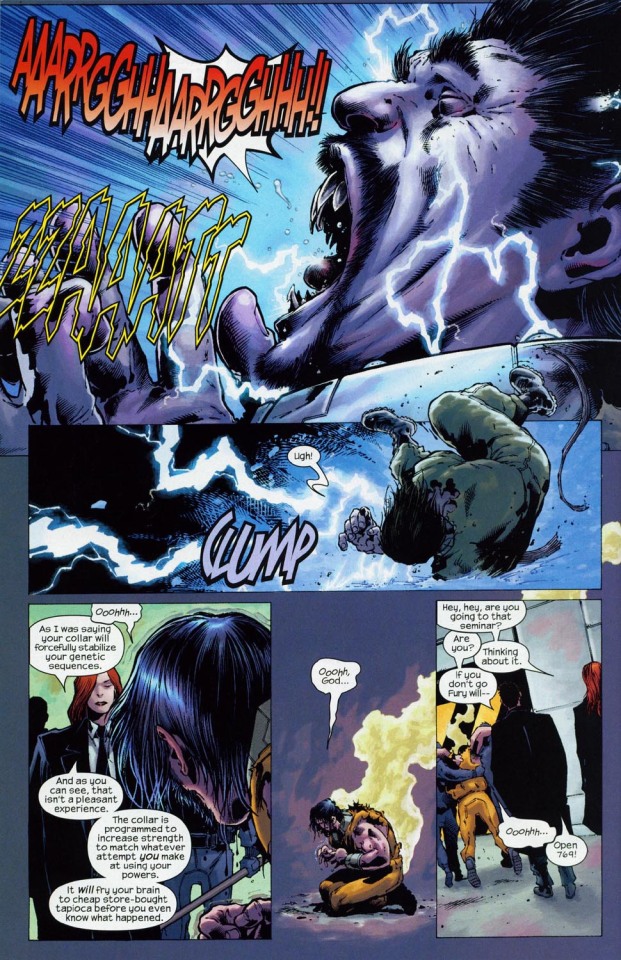
Sharon-A-Day, Day 621 (9/13/23)
Ultimate Six 1. On sale 9/17/03. "(Chapter 1)"
Writer: Brian Michael Bendis
Penciller: Trevor Hairsine
Inker: Danny K. Miki
Letterer: Christopher P. Eliopoulos
Colorist: David Stewart
Editor: Ralph Macchio
Sharon explains things to Kraven.
#sharon carter#agent 13#jimmy woo#brian michael bendis#trevor hairsine#danny k miki#christopher p eliopoulos#david stewart#ralph macchio#kraven the hunter
5 notes
·
View notes
Text
#Biden and China, RIP #GregGumble & #JimmyCarter, The Diddy Files, The Brothers Hack the Matrix 90! The 2024 Clownshow on The Brothers Hack the Matrix every Monday Evening 6/5C https://www.youtube.com/live/ZNE-bycScKw
0 notes
Text
this is a poll for a movie that doesn't exist.
It is vintage times. The powers that be have decided to again remake the classic vampire novel Dracula for the screen. in an amazing show of inter-studio solidarity, Hollywood’s most elite hotties are up for the starring roles. the producers know whoever they cast will greatly impact the genre, quality, and tone of the finished film, so they are turning to their wisest voices for guidance.
you are the new casting director for this star-studded epic. choose your players wisely.
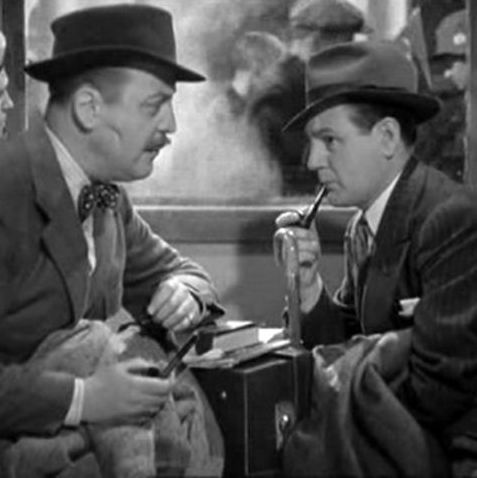
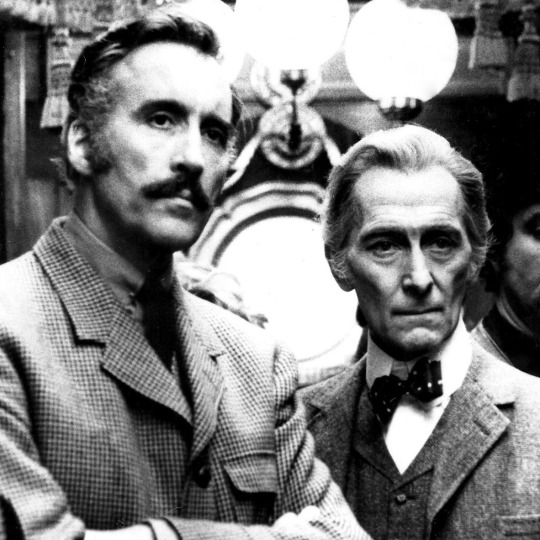

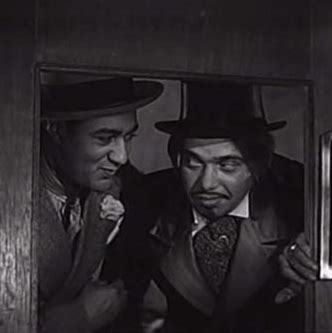
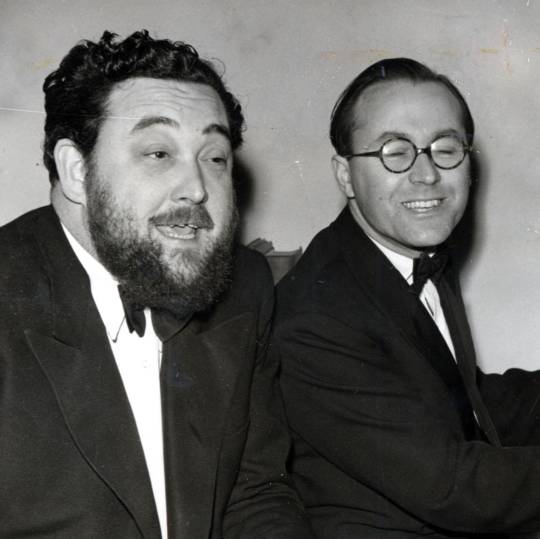

Previously cast:
Jonathan Harker—Jimmy Stewart
The Old Woman—Martita Hunt
Count Dracula—Gloria Holden
Mina Murray—Setsuko Hara
Lucy Westenra—Judy Garland
The Three Voluptuous Women—Betty Grable, Marilyn Monroe, and Lauren Bacall
The Agonized Mother—Mary Philbin
Dr. Jack Seward—Vincent Price
Quincey P. Morris—Toshiro Mifune
Arthur Holmwood—Sidney Poitier
R.M. Renfield—Conrad Veidt
The Captain of the Demeter—Omar Sharif
The First Mate of the Demeter—Leonard Nimoy
Mr. Swales—Ed Wynn
The Correspondent for The Daily Graph—Ethel Waters
Dracula in dog form—Frank Oz with a puppet
Sister Agatha—Angela Lansbury
Mrs. Westenra—Gladys Cooper
The solicitors are not described, but the very dull communication between Messrs. Carter, Paterson & Co. to Messrs. Billington & Son can be found here.
#dracula daily#dracula casting#for anyone wondering where any particular duo is. i'm saving some for later double acts we come across!#hotvintagepoll#silly times#minis
246 notes
·
View notes
Text
Boeing, Spirit and Jetblue, a monopoly horror-story
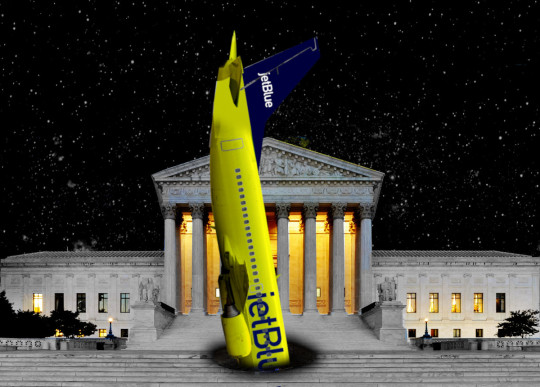
Catch me in Miami! I'll be at Books and Books in Coral Gables TONIGHT (Jan 22) at 8PM. Berliners: Otherland has added a second date (Jan 28) for my book-talk after the first one sold out - book now!

Last week, William Young, an 82 year old federal judge appointed by Ronald Reagan, blocked the merger of Spirit Airlines and Jetblue. It was a seismic event:
https://storage.courtlistener.com/recap/gov.uscourts.mad.254267/gov.uscourts.mad.254267.461.0_6.pdf
Seismic because the judge's opinion is full of rhetoric associated with the surging antitrust revival, sneeringly dismissed by corporate apologists as "hipster antitrust." Young called America's airlines and "oligopoly," a situation he blamed on out-of-control mergers. As Matt Stoller writes, this is the first airline merger to be blocked by the DOJ and DOT since deregulation in 1978:
https://www.thebignewsletter.com/p/antitrust-enforcers-block-the-jetblue
The judge wasn't shy about why he was reviving a pre-Jimmy Carter theory of antitrust: "[the merger] does violence to the core principle of antitrust law, 'to protect] markets –- and its market participants — from anticompetitive harm."
The legal arguments the judge advances are fascinating and worthy of study:
https://twitter.com/johnmarknewman/status/1747343447227519122
But what really caught my eye was David Dayen's American Prospect article about the judge's commentary on the state of the aviation industry:
https://prospect.org/infrastructure/transportation/01-19-2024-how-boeing-ruined-the-jetblue-spirit-merger/
Why, after all, have Spirit and Jetblue been so ardent in pursuing mergers? Jetblue has had two failed merger attempts with Virgin, and this is the third time they've failed in an attempt to merge with Spirit. Spirit, meanwhile, just lost a bid to merge with Frontier. Why are these two airlines so obsessed with combining with each other or any other airline that will have them?
As Dayen explains, it's because US aviation has been consumed by monopoly, hollowed out to the point of near collapse, thanks to neoliberal policies at every part of the aviation supply-chain. For one thing, there's just not enough pilots, nor enough air-traffic controllers (recall that Reagan's first major act in office was to destroy the air traffic controller's union).
But even more importantly, there are no more planes. Boeing's waitlist for airplane delivery stretches to 2029. And Boeing is about to deliver a lot fewer planes, thanks to its disastrous corner-cutting, which grounded a vast global fleet of 737 Max aircraft (again):
https://prospect.org/infrastructure/transportation/2024-01-09-boeing-737-max-financial-mindset/
The 737 disaster(s) epitomize the problems of inbred, merger-obsessed capitalism. As Luke Goldstein wrote, the rampant defects in Boeing's products can be traced to the decision to approve Boeing's 1997 merger with McDonnell-Douglas, a company helmed by Jack Welch proteges, notorious for cost-cutting at the expense of reliability:
https://prospect.org/infrastructure/transportation/2024-01-09-boeing-737-max-financial-mindset/
Boeing veterans describe the merger as the victory of the bean-counters, which led to a company that chases short-term profits over safety and even the viability of its business:
https://www.airliners.net/forum/viewtopic.php?t=213075
After all, the merger turned Boeing into the single largest exporter in America, a company far too big to fail, teeing up tens of billions from Uncle Sucker, who also account for 40% of Boeing's income:
https://www.thebignewsletter.com/p/its-time-to-nationalize-and-then
The US government is full of ex-Boeing execs, just as Boeing's executive row is full of ex-US federal aviation regulators. Bill Clinton's administration oversaw the creation of Boeing's monopoly in the 1990s, but it was the GOP that rescued Boeing the first time the 737 Maxes started dropping out of the sky.
Boeing's biggest competitor is the state-owned Airbus, a joint venture whose major partners are the governments of France, Spain and Germany – governments that are at least theoretically capable of thinking about the public good, not short-term profits. Boeing's largest equity stakes are held by the Vanguard Group, Vanguard Group subfiler, Newport Trust Company, and State Street Corporation:
https://prospect.org/blogs-and-newsletters/tap/2024-01-18-airbus-advantage/
As Matt Stoller says, America has an airline that the public bails out, protects, and subsidizes but has no say over. Boeing has all the costs of public ownership and none of the advantages. It's the epitome of privatized gains and socialized losses.
This is Reagan's other legacy, besides the disastrous shortage of air-traffic controllers. The religious belief in deregulation – especially deregulation of antitrust enforcement – leads to a deregulated market. It leads to a market that is regulated by monopolists who secretly deliberate, behind closed board-room doors, and are accountable only to their shareholders. These private regulators are unlike government regulators, who are at least nominally bound by obligations to transparency and public accountability. But they share on thing in common with those public regulators: when they fuck up, the public has to pay for their mistakes.
It's a good thing Boeing's executives are too big to fail, because they fail constantly. Boeing execs who are warned by subcontractors of dangerous defects in their planes order those subcontractors to lie, or lose their contracts:
https://www.levernews.com/boeing-supplier-ignored-warnings-of-excessive-amount-of-defects-former-employees-allege/
As a result of Boeing's mismanagement, America's only aircraft supplier steadily has lost ground to Airbus, which today enjoys a 2:1 advantage over Boeing. But it's not just Boeing that's the weak link aviation. US aviation is a chain entirely composed of weak links.
Take jet engines: Pratt & Whitney are Spirit's major engine supplier, but these engines suck as much as Boeing's fuselages. Much of Spirit's fleet is chronically grounded because the engines don't run. The reason Spirit buys its engines from those loveable goofballs at Pratt & Whitney? The Big Four airlines have bought all the engines for sale from other suppliers, leaving smaller airlines to buy their engines from fat-fingered incompetents.
This is why – as Dayen notes – smaller US airlines are so horny for intermarriage. They can't grow by adding routes, because there are no pilots. Even if they could get pilots, there'd be no slots because there are no air traffic controllers. But even if they could get pilots and slots, there are no planes, because Boeing sucks and Airbus can't make planes fast enough to supply the airlines that don't trust Boeing. And even if they could get aircraft, there are no engines because the Big Four aviation cartel cornered the market on working jet engines.
Part of Jetblue and Spirit's pitch was that they hand off the routes that they'd cut after their merger to other small airlines, like Frontier and Allegiant. But Frontier and Allegiant can't service those routes: they don't have pilots, slots, planes or engines.
Spirit hasn't been profitable since 2019 and is sitting on $4b in debt. Jetblue was proposing to finance its acquisition with another $3.5b in debt. The resulting airline could only be profitable by sharply cutting routes and massively raising prices, cutting 6.1m seats/year. With a debt:capital ratio of 111%, the company would have no slack and would need a bailout any time anything went wrong. Not coincidentally, the Big Four airlines also have debt:capital ratios of about 100-120%, and they do get bailouts ever time anything goes wrong.
As William McGee reminds us, it's been 14 years since anyone's started a new US airline:
https://twitter.com/WilliamJMcGee/status/1747363491445375072
US aviation is deeply cursed. But Boeing's self-disassembling aircraft show us why we can't fix it by allowing mergers: private monopolies, shorn of the discipline of competition and regulation, are extraction machines that turn viable businesses into debt-wracked zombies.
This is a subject that's beautifully illustrated in Dayen's 2020 book Monopolized, in the chapter on health care:
https://pluralistic.net/2021/01/29/fractal-bullshit/#dayenu
The US health care system has been in trouble for a long time, but the current nightmare starts with the deregulation of pharma. Pharma companies interbred with one another in a string of incestuous marriages that produced these dysfunctional behemoths that were far better at shifting research costs to governments and squeezing customers than they were at making drugs. The pharma giants gouged hospitals for their products, and in response, hospitals underwent their own cousin-fucking merger orgy, producing regional monopolies that were powerful enough to resist pharma's price-hikes. But in growing large enough to resist pharma profiteering, the hospitals also became powerful enough to screw over insurers. Insurers then drained their own gene pool by combining with one another until most of us have three or fewer insurers we can sign up with – companies that are both big enough to refuse hospital price-hikes, and to hike premiums on us.
Thus monopoly begets monopoly: with health sewn up by monopolies in medical tech, drugs, pharmacy benefit managers, insurance, and hospitals, the only easy targets for goosing profits are people:
https://pluralistic.net/2022/01/05/hillrom/#baxter-international
This is how you get a US medical system that costs more than any other rich nation's system to operate, delivers worse outcomes than those other systems, and treats medical workers worse than any other wealthy country.
Now, rich people can still buy their way out of this mess, but you have to be very rich indeed to buy your way out of the commercial aviation system. There's a lot of 1%ers who fly commercial, and they're feeling the squeeze – and there's no way they're leasing their own jets.
Stein's Law holds that "anything that can't go on forever will eventually stop." America's aviation mergers – in airlines, aircraft and engines – have hollowed out the system. The powerful, brittle companies that control aviation have so much power over their workforce that they've turned air traffic controller and pilot into jobs that no one wants – and they used their bailout money to buy out the most senior staff's contracts, sending them to early retirement.
Now, I'm with the people who say that most of US aviation should be replaced with high-speed rail, but that's not why our technocrats and finance barons have gutted aviation. They did it to make a quick buck. A lot of quick bucks. Now the system is literally falling to pieces in midair. Now the system is literally on fire:
https://www.nytimes.com/2024/01/19/us/miami-boeing-plane-engine-fire.html
Which is how you get a Reagan appointed federal judge issuing an opinion that has me punching the air and shouting, "Yes, comrade! To the barricades!" Anything that can't go on forever will eventually stop. When the system is falling to pieces around you, ideology disintegrates like a 737 Max.

I'm Kickstarting the audiobook for The Bezzle, the sequel to Red Team Blues, narrated by @wilwheaton! You can pre-order the audiobook and ebook, DRM free, as well as the hardcover, signed or unsigned. There's also bundles with Red Team Blues in ebook, audio or paperback.

If you'd like an essay-formatted version of this post to read or share, here's a link to it on pluralistic.net, my surveillance-free, ad-free, tracker-free blog:
https://pluralistic.net/2024/01/21/anything-that-cant-go-on-forever/#will-eventually-stop

Image: Vitaly Druchenok (modified) https://commons.wikimedia.org/wiki/File:ECAir_Boeing_737-306_at_Brazzaville_Airport_by_Vitaly_Druchenok.jpg
CC BY-SA 4.0 https://creativecommons.org/licenses/by-sa/4.0/deed.en
--
Joe Ravi (modified) https://commons.wikimedia.org/wiki/File:Panorama_of_United_States_Supreme_Court_Building_at_Dusk.jpg
CC BY-SA 3.0 https://creativecommons.org/licenses/by-sa/3.0/deed.en
#pluralistic#aviation#antitrust#monopoly#boeing#jetblue#spirit airlines#oligopoly#air traffic controllers#airbus#steins law
252 notes
·
View notes
Text
How many times did we get an offer to split the land with the Jews?
1. Peel Commission (1937): This was the first major proposal for partition by the British, recommending a division of Palestine into separate Jewish and Arab states. The plan proposed a small Jewish state in>
parts of the north and coastal areas, with the remainder of the land going to the Arabs. The Jewish leadership accepted it in principle but wanted modifications, while the Arabs outright rejected it.
2. United Nations Partition Plan (1947): Known as UN Resolution 181, this> was the most significant partition plan prior to the establishment of the State of Israel. The plan proposed the creation of independent Jewish and Arab states, with Jerusalem as an international city. The Jewish community accepted the plan, but the Arab leadership rejected it,> leading to the 1947–1948 Civil War and the subsequent Arab-Israeli War of 1948.
3. Armistice Agreements (1949): After the 1948 Arab-Israeli War, armistice agreements were signed between Israel and its neighboring Arab states, but these did not constitute a formal partition plan>
Instead, they established ceasefire lines, known as the Green Line, without official recognition of borders.
4. Rogers Plan (1969): Proposed by U.S. Secretary of State William P. Rogers, the Rogers Plan aimed at resolving the Israeli-Arab conflict after the 1967 Six-Day War.>
The plan called for Israeli withdrawal from territories occupied in the war (including the West Bank, Gaza, and East Jerusalem) in exchange for peace and recognition by Arab states.
Impact: The plan was rejected by both Israel and the Arab states, as Israel was unwilling to>
the pre-1967 borders, and the Arab states refused to recognize Israel or negotiate at that time.
5. Camp David Accords (1978): The Camp David Accords were brokered by U.S. President Jimmy Carter between Egyptian President Anwar Sadat and Israeli Prime Minister Menachem Begin.>
Two frameworks were agreed upon: A. Framework for Peace in the Middle East B. Egypt-Israel Peace Treaty (1979) Impact: The accords improved relations between Israel and Egypt but did not resolve the broader Israeli-Palestinian conflict, nor did they lead to immediate Palestinian> autonomy.
6. Madrid Conference (1991): After the Gulf War, the U.S. and the Soviet Union co-sponsored the Madrid Peace Conference, bringing Israel and Arab states (including Palestinian representatives) to the negotiating table for the first time.
Impact: The conference> initiated direct, face-to-face negotiations but did not result in a final agreement. However, it paved the way for later agreements, including the Oslo Accords.
7. Oslo Accords (1993-1995): The Oslo Accords were the first direct agreement between Israel and the Palestine>
Liberation Organization (PLO). The accords outlined a framework for Palestinian self-governance in parts of the West Bank and Gaza and a five-year timeline for further negotiations on issues like borders, refugees, and Jerusalem. Impact: The Oslo Accords led to the establishment>
of the Palestinian Authority and the division of the West Bank into Areas A, B, and C, each with varying levels of Palestinian and Israeli control. However, final status issues were left unresolved, and subsequent violence, including the Second Intifada (2000-2005), disrupted> the peace process.
8. Camp David Summit (2000): U.S. President Bill Clinton hosted Israeli Prime Minister Ehud Barak and Palestinian leader Yasser Arafat at Camp David to negotiate a final status agreement. Barak offered a two-state solution, proposing that Israel would>
withdraw from most of the West Bank and Gaza, while retaining some settlement blocs and offering a shared Jerusalem. Arafat rejected the offer.
Impact: The failure of the summit, combined with the outbreak of the Second Intifada, led to a collapse in the peace process.>
9. Taba Summit (2001): Following the Camp David failure, Israeli and Palestinian negotiators met in Taba, Egypt, to try to salvage the peace process. The talks made significant progress, with Israel offering a near-complete withdrawal from the West Bank and Gaza and compromises>
on Jerusalem. However, the negotiations were interrupted by Israeli elections and the Second Intifada.
Impact: While progress was made, the talks ended without a final agreement, and violence escalated soon after.>
10. Annapolis Conference (2007): The Annapolis Conference, held in November 2007 in Annapolis, Maryland, was a peace summit aimed at resolving the Israeli-Palestinian conflict and promoting the two-state solution. It was initiated by U.S. President George W. Bush and attended by>
Israeli Prime Minister Ehud Olmert, Palestinian Authority President Mahmoud Abbas, and representatives from several other nations. The conference sought to revive peace negotiations based on previous agreements, with the goal of establishing an independent Palestinian state>
alongside Israel. During the negotiations, Olmert made a far-reaching peace proposal to Abbas, offering a near-total Israeli withdrawal from the West Bank, a territorial link to Gaza, and international control of Jerusalem's Old City. Abbas, however, rejected the offer.>
11. Trump Administration Peace Plan ("Deal of the Century") (2020): The Trump administration proposed a peace plan in January 2020, which envisioned a two-state solution, with Israel retaining large portions of the West Bank, including settlement blocs, while offering the>
Palestinians limited autonomy over a non-contiguous state. Jerusalem would remain Israel's capital, and the Palestinians would receive some compensation for land losses.
Impact: The plan was welcomed by Israel but rejected outright by the Palestinian leadership.
Ahmed Al-Khalidi
32 notes
·
View notes
Text
How Criminal Case Victims would be killers
1. Olly Oliver: He'd do anything to protect his band and reputation...and I mean ANYTHING
2. Jennifer Carter: She would murder Trish if Raphael rejected her and kept his relationship with her
3. Lisa Edward's: Accident or self-defense (I don't see her killing anyone on purpose)
4. Freddy Stewart: If someone caught him stealing stuff from their house... he'd panic and attack the home owner
5. Jimmy Ice P Lewis: He has huge beef with Trevor... so instead of Trevor killing Jimmy because of him losing his job, he'd threaten to turn him in for animal endangerment... in my au Trevor has a daughter... so Jimmy would kill his daughter to send a message to him
6. Diane Cooper: If she was the puppeteer instead of Freddie, but her motive would be different, she'd only kill abusive parents who treat their children horribly... Freddie doesn't have any children, but he somehow finds out her secret, and he is gonna turn him in so... she silenced him (Yanns parents weren't abusive.. Diane killed them on accident because she thought they were treating Yann horribly even though they weren't, so that was her mistake)
7. Rex Logan: He wanted to keep his acting career alive... so he'd kill someone for catching him doing illegal things that could end his career
8. Nathan: He killed Kit in self-defense and thankfully was clear of all charges during court
9. Cindy McMinn: She wanted the role of the killer, but Toby didn't give it to her, saying she wasn't serial killer material
10. René Narcisse: Pulls a freaking Miss Circle and kills a student for failing his test
11. Marcus Butler: For an idea he had for an upcoming comic book, he'd kill someone in that method to find out if it can actually happen in real life (that bish is stupid)
12. Roxanne: She wanted to keep her secret of helping the demons private, but Fabian found out, so she silenced him
(If you have any more ideas, let me know down below)
#criminal case game#criminal case grimsborough#criminal case pacific bay#criminal Case Conspiracy#criminal Case#criminal case season 2#criminal case season 1#criminal Case season 5#criminal Case season 7#criminal case supernatural investigations
23 notes
·
View notes
Text
JIMMY CARTER: Now we know why his personal history has been completely scrubbed from the Internet
Posted on December 30, 2024 by State of the Nation
https://stateofthenation.info/?p=10475
Look, no one becomes President of the United States of America unless they were very carefully chosen to sit in the Oval Office—OBVIOUSLY!
Certainly, a completely unknown peanut farmer from Georgia can only come out of nowhere to win POTUS because his hidden masters made it happen on purpose.
State of the Nation
As always, the untold back story of every POTUS is kept so quiet you can barely find anything on the Internet about it today.
This Alt Media platform made a small research project of the real Jimmy Carter story many years ago before the World Wide Web was scrubbed completely clean of all the hard evidence and high-integrity testimony provided by various insiders and whistleblowers regarding how Jimmy Carter was actually selected as the Democrat’s 1976 presidential nominee. The only thing we could find this year is the following excerpt which provides a crucial piece of evidence about why Carter’s [UNKNOWN TO HIM] Khazarian masters planted him in the White House.
The low point of Jimmy Carter’s life came in 1966, and it was then that he recommitted himself to his Christian faith. Carter — who died on Sunday at the age of 100 — was a 42-year-old state senator from Georgia, and he was at a personal crossroads. He’d made a bid for governor and lost, coming in third out of six candidates. He’d gone deep into debt to finance the campaign. And he was horrified that an avowed white supremacist, Lester Maddox, had been elected governor, in part because Carter had split the moderate vote with another candidate. Carter was “profoundly depressed,” according to adviser Peter Bourne. He told a friend he questioned if he’d “ever amount to much.” He was also “disillusioned about [his] religious faith,” his biographer Jonathan Alter wrote. But out of the depths of Carter’s despair, he sought — and found — a newly enlivened faith. He would eventually describe himself as having become a “born again” Christian, a popular term in the late 1960s and into the 1970s. Carter’s religious devotion would animate his action for the rest of his life. But it was not a simple faith.[1]
The key paragraph above, for the purposes of this exposé, is the boldfaced one.
So the very simple and short back story goes like this: The USA’s shadow government wanted a POTUS in 1977 who would be very easy to manipulate and control. For a variety of reasons, the most important having to do with the Middle East geopolitical chessboard at that time, they wanted a real born-again Christian whose strong sympathies lay with the Christian communities throughout the Mideast that existed among vast Muslim majorities. That person was Jimmy Carter.
There was another even more important scheme concerning driving the Russian military out of Afghanistan, one which operated under the US State Department black budget of covertly forming the CIA-directed Afghan Mujahideen.
10 notes
·
View notes
Text
Character Name Ideas (Male)
So I've been browsing through BehindTheName (great resource!) recently and have compiled several name lists. Here are some names, A-Z, that I like. NOTE: If you want to use any of these please verify sources, meanings etc, I just used BehindTheName to browse and find all of these. Under the cut:
A: Austin, Aiden, Adam, Alex, Angus, Anthony, Archie, Argo, Ari, Aric, Arno, Atlas, August, Aurelius, Alexei, Archer, Angelo, Adric, Acarius, Achilou, Alphard, Amelian, Archander B: Bodhi, Bastian, Baz, Beau, Beck, Buck, Basil, Benny, Bentley, Blake, Bowie, Brad, Brady, Brody, Brennan, Brent, Brett, Brycen C: Cab, Cal, Caden, Cáel, Caelan, Caleb, Cameron, Chase, Carlos, Cooper, Carter, Cas, Cash, Cassian, Castiel, Cedric, Cenric, Chance, Chandler, Chaz, Chad, Chester, Chet, Chip, Christian, Cillian, Claude, Cicero, Clint, Cody, Cory, Coy, Cole, Colt, Colton, Colin, Colorado, Colum, Conan, Conrad, Conway, Connor, Cornelius, Creed, Cyneric, Cynric, Cyrano, Cyril, Cyrus, Crestian, Ceric D: Dallas, Damien, Daniel, Darach, Dash, Dax, Dayton, Denver, Derek, Des, Desmond, Devin, Dewey, Dexter, Dietrich, Dion, Dmitri, Dominic, Dorian, Douglas, Draco, Drake, Drew, Dudley, Dustin, Dusty, Dylan, Danièu E: Eadric, Evan, Ethan, Easton, Eddie, Eddy, Einar, Eli, Eilas, Eiljah, Elliott, Elton, Emanuel, Emile, Emmett, Enzo, Erik, Evander, Everett, Ezio F: Faolán, Faron, Ferlin, Felix, Fenrir, Fergus, Finley, Finlay, Finn, Finnian, Finnegan, Flint, Flip, Flynn, Florian, Forrest, Fritz G: Gage, Gabe, Grady, Grant, Gray, Grayson, Gunnar, Gunther, Galahad H: Hale, Harley, Harper, Harvey, Harry, Huey, Hugh, Hunter, Huxley I: Ian, Ianto, Ike, Inigo, Isaac, Isaias, Ivan, Ísak J: Jack, Jacob, Jake, Jason, Jasper, Jax, Jay, Jensen, Jed, Jeremy, Jeremiah, Jesse, Jett, Jimmie, Jonas, Jonas, Jonathan, Jordan, Josh, Julien, Jovian, Jun, Justin, Joseph, Joni, K: Kaden, Kai, Kale, Kane, Kaz, Keane, Keaton, Keith, Kenji, Kenneth, Kent, Kevin, Kieran, Kip, Knox, Kris, Kristian, Kyle, Kay, Kristján, Kristófer L: Lamont, Lance, Landon, Lane, Lars, László, Laurent, Layton, Leander, Leif, Leo, Leonidas, Leopold, Levi, Lewis, Louie, Liam, Liberty, Lincoln, Linc, Linus, Lionel, Logan, Loki, Lucas, Lucian, Lucio, Lucky, Luke, Luther, Lyall, Lycus, Lykos, Lyle, Lyndon, Llewellyn, Landri, Laurian, Lionç M: Major, Manny, Manuel, Marcus, Mason, Matt, Matthew, Matthias, Maverick, Maxim, Memphis, Midas, Mikko, Miles, Mitch, Mordecai, Mordred, Morgan, Macari, Maïus, Maxenci, Micolau, Miro N: Nate, Nathan, Nathaniel, Niall, Nico, Niels, Nik, Noah, Nolan, Niilo, Nikander, Novak, O: Oakley, Octavian, Odin, Orlando, Orrick, Ǫrvar, Othello, Otis, Otto, Ovid, Owain, Owen, Øyvind, Ozzie, Ollie, Oliver, Onni P: Paisley, Palmer, Percival, Percy, Perry, Peyton, Phelan, Phineas, Phoenix, Piers, Pierce, Porter, Presley, Preston, Pacian Q: Quinn, Quincy, Quintin R: Ragnar, Raiden, Ren, Rain, Rainier, Ramos, Ramsey, Ransom, Raul, Ray, Roy, Reagan, Redd, Reese, Rhys, Rhett, Reginald, Remiel, Remy, Ridge, Ridley, Ripley, Rigby, Riggs, Riley, River, Robert, Rocky, Rokas, Roman, Ronan, Ronin, Romeo, Rory, Ross, Ruairí, Rufus, Rusty, Ryder, Ryker, Rylan, Riku, Roni S: Sammie, Sammy, Samuel, Samson, Sanford, Sawyer, Scout, Seán, Seth, Sebastian, Seymour, Shane, Shaun, Shawn, Sheldon, Shiloh, Shun, Sid, Sidney, Silas, Skip, Skipper, Skyler, Slade, Spencer, Spike, Stan, Stanford, Sterling, Stevie, Stijn, Suni, Sylvan, Sylvester T: Tab, Tad, Tanner, Tate, Tennessee, Tero, Terrance, Tevin, Thatcher, Tierno, Tino, Titus, Tobias, Tony, Torin, Trace, Trent, Trenton, Trev, Trevor, Trey, Troy, Tripp, Tristan, Tucker, Turner, Tyler, Ty, Teemu U: Ulric V: Valerius, Valor, Van, Vernon, Vespasian, Vic, Victor, Vico, Vince, Vinny, Vincent W: Wade, Walker, Wallis, Wally, Walt, Wardell, Warwick, Watson, Waylon, Wayne, Wes, Wesley, Weston, Whitley, Wilder, Wiley, William, Wolfe, Wolfgang, Woody, Wulfric, Wyatt, Wynn X: Xander, Xavier Z: Zachary, Zach, Zane, Zeb, Zebediah, Zed, Zeke, Zeph, Zaccai
67 notes
·
View notes
Text

1976: John told Paul that all he ever did was write silly love songs, so Paul wrote a song… Another great one to mention, “December ’63 (Oh, What a Night) by The Four Seasons… man that’s a great song. Sly came out with the classic Rocky, an instant success and The Enterprise, the first space shuttle, was unveiled. Gas was only fifty-nine cents a gallon.
I remember July 4th, 1976, thirteen days before this photo, vividly. I was a little kid, and we went to the racetrack in Riverhead Long Island to watch the modified race cars and the fireworks display for the 200th Anniversary of the United States of America.
Too bad we elected Jimmy Carter that year.
Meanwhile, at Edwards AFB, a Boom Operator was having a little bit of fun refueling the Fairchild Republic A-10 Thunderbolt II (named after the P-47 Thunderbolt), lovingly referred to as the Warthog. Not the fastest jets I’ve ever refueled, but damn they can take a lickin’ and keep on tickin’.
Edwards Air Force Base, June 23, 1976
@tcamp202 via X
11 notes
·
View notes
Note
How many presidents have had both of their parents alive when they were president?
Three Presidents have had both parents alive when they became President:
•Ulysses S. Grant Grant was the first President with both of his parents alive at the time of his inauguration. His father, Jesse Root Grant, died on June 29, 1873 during Grant’s second term. His mother, Hannah Simpson Grant, survived both of his terms and died two years before he did, on May 11, 1883. •John F. Kennedy Not only were both of JFK’s Presidents alive when he became President, but they are the only parents of a President who both outlived him. JFK was assassinated in 1963. His father, Joseph P. Kennedy Sr., died in 1969, and his mother, Rose Fitzgerald Kennedy died in 1995 at the age of 104. •George W. Bush Both of Bush’s parents were alive when he took office and survived his entire two-term Presidency. His father, former President George H.W. Bush, died on November 30, 2018, just six months after the death of his mother, Barbara Bush, in April 2018.
Several Presidents have had either their father or mother still alive when they became President:
FATHER •John Quincy Adams: The first son of a President to be elected President himself was also the first President whose father was still alive at the time of his inauguration. John Adams died July 4, 1826, a little over a year into JQA’s Presidency. •Millard Fillmore: Nathaniel Fillmore lived through his son’s entire Presidency (1850-1853) and died in his 90s during the Civil War, on March 28, 1863. •Warren G. Harding: Harding’s father, George Tryon Harding, lived through his son’s entire Administration and died on November 19, 1928. Harding, who died in office on August 2, 1923, was the first President who was outlived by his father. •Calvin Coolidge: Not only did Coolidge’s father, John Calvin Coolidge, live to see his son become President, but he actually administered the oath of office. Coolidge, the Vice President at the time, was visiting his father when President Harding died in office and the elder Coolidge, a notary public, administered the Presidential oath at the family home in Vermont. Coolidge’s father died on March 18, 1926 during President Coolidge’s second term.
MOTHER •George Washington: Mary Ball Washington died August 25, 1789, a little less than four months after his first inauguration. •John Adams: Susanna Boylston Adams died April 21, 1797, just under two months after Adams became President. •James Madison: Eleanor Conway Madison lived through both of her son’s terms as President (1809-1817) and died February 11, 1829 at the age of 98. •James K. Polk: Polk was the first President who didn’t outlive his mother. She died on January 11, 1852, almost three years after Polk left office and died. •James Garfield: Garfield’s mother, Eliza Ballou Garfield, lived to see him become President and die in office. She died on January 21, 1888, almost seven years after he was assassinated. •William McKinley: McKinley’s mother, Nancy Allison McKinley, lived to attend her son’s first inauguration, but died several months later, December 12, 1897. •Franklin D. Roosevelt: FDR’s mother, Sara Delano Roosevelt, lived to see her son inaugurated three times. She died during her son’s third term, on September 7, 1941. •Harry S. Truman: Truman’s mother, Martha Young Truman, lived to see her son succeed to the Presidency in April 1945. She died during his first term, on July 26, 1947, at the age of 94. •Jimmy Carter: Lillian Carter lived through her son’s entire Presidency and was even sent to represent him at events overseas several times, which made her a celebrity in her own right during his Presidency. She died on April 30, 1983, two years after Carter left the White House. •George H.W. Bush: Bush’s mother, Dorothy Walker Bush, lived to see her son become President. She died on November 19, 1992, two weeks after her son lost his bid for re-election. •Bill Clinton: Virginia Cassidy Kelley, Clinton’s mother, lived to see him become President but died less than a year later, on January 6, 1994.
#Presidents#History#Presidency#Presidential History#Presidential Stats#Presidential Data#POTUS Stats#POTUS Data#First Families#Presidential Parents#Parents of the Presidents#Fathers of the Presidents#Mothers of the Presidents#Presidential Families
11 notes
·
View notes
Text
The matchups have arrived!
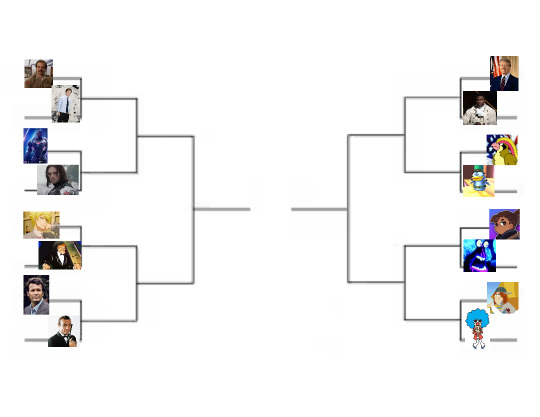

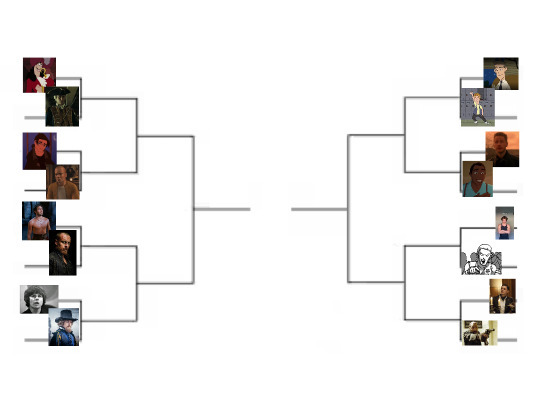
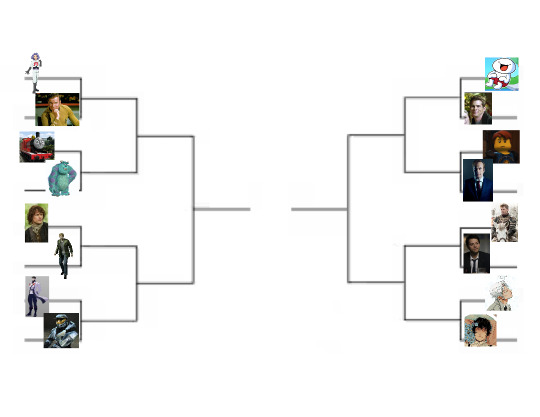
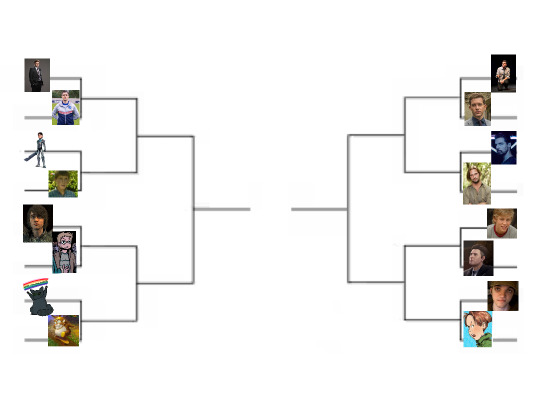

This tournament includes 96 characters named James, Jim, Jimmy, and Jay (with some others too), and they will all be competing in 6 brackets of 16, and the winners of those will be participating in two semifinals, and the winners of the semifinals will fight each other in the final finals! (Basically, it’s just how I did it on @blue-character-brawl, but with the amount of participants cut in half.)
Here are the matchups:
Bracket 1
Jim Hopper (Stranger Things) VS. Jim Halpert (The Office)
James “Rhodey” Rhodes (Marvel) VS. James “Bucky” Barnes (Marvel)
James Bonde (Moriarty the Patriot) VS. James Blond (Super Mario Brothers Super Show)
Jim Rockford (The Rockford Files) VS. James Bond (James Bond)
Jimmy Carter (Real Life) VS. James Madison (Hamilton)
James Byrd (@byrdsfly) VS. James Byrd (Spyro the Dragon)
JayMoji (Real Life) VS. James Phryllas (Real Life)
Jimmy Z (Wild Kratts) VS. Jimmy T (WarioWare)
Bracket 2
James Baxter (Adventure Time) VS. James (Adventure Time)
Jamestown, Virginia (Real Life) VS. James Webb Telescope (Real Life)
Jim Henson (Real Life) VS. Jim Davis (Real Life)
Jimmy Olsen (DC Comics) VS. Jim Gordon (DC Comics)
Jay Gatsby (The Great Gatsby) VS. James Henry Trotter (James and the Giant Peach)
Jimmy Neutron (Jimmy Neutron) VS. Shimmy Jimmy (Phineas and Ferb)
James McCloud (Star Fox) VS. Jay Elbird (Ace Attorney)
James (Wii Sports) VS. James (Papa Louie)
Bracket 3
Captain James Hook (Peter Pan) VS. James Norrington (Pirates of the Caribbean)
Jim Hawkins (Treasure Island) VS. Jimmy Hopkins (Bully)
Jamie Waring (Black Swan) VS. James Flint (Black Sails)
Jamie McCrimmon (Doctor Who) VS. King James IV (Doctor Who)
Dr. James Possible (Kim Possible) VS. Jimmy Pesto Jr. (Bob’s Burgers)
Prince James (Once Upon a Time) VS. James (Princess and the Frog)
jim teacher (This TikTok) VS. Nagasaki James (Noonbit Man)
James March (American Horror Story) VS. James Vane (The Picture of Dorian Gray)
Bracket 4
James (Pokémon) VS. James T. Kirk (Star Trek)
James the Red Engine (Thomas and Friends) VS. James P. Sullivan (Monsters, Inc.)
Jamie Fraser (Outlander) VS. James Sunderland (Silent Hill 2)
James Ironwood (RWBY) VS. Private Jimmy (Red vs Blue)
James Rallison (Real Life) VS. James Huckle (The Search for Santa Paws)
Jay Walker (Ninjago) VS. Jimmy McGill (Better Call Saul)
Jaime Lannister (Game of Thrones) VS. Jimmy Novak (Supernatural)
Jem Carstairs (The Infernal Devices) VS. James Herondale (The Last Hours)
Bracket 5
James Wilson (House MD) VS. Jamie Tartt (Ted Lasso)
Jim Lake Jr. (Trollhunters) VS. James Hunter (Animal Ark)
James (The Walking Dead) VS. Jimmy (Scott Pilgrim)
James-Roman Grilfalinas (@artificialkids-2k23-official) VS. Jimmy Lightning (Peggle)
Jamie Wellerstein (The Last Five Years) VS. Jamie Winter (Midsomer Murders)
James Holden (The Expanse) VS. James Ford (Lost)
James Garrett (Zoey 101) VS. James Amber (Life is Strange)
Jay Merrick (Marble Hornets) VS. Meanie Jim (Junie B. Jones)
Bracket 6
Jim Moriarty (Sherlock Holmes) VS. James Maguire (Derry Girls)
James Black (Detective Conan) VS. James Gunn (Real Life)
James the Cat (James the Cat) VS. Jimmy the Robot (The Aquabats)
Jimmy King (Emmerdale) VS. Jim Johnman (Monster Factory)
Jame Palrose (Terror Island) VS. Jimmy (Johnny the Homicidal Maniac)
James Diamond (Big Time Rush) VS. James Herriot (All Creatures Great and Small)
James West (The Wild Wild West) VS. James Maxwell (We Happy Few)
Jimmy Campbell (Bandstand) VS. James E. Negatus (Yonderland)
Round 1 of Brackets 1 and 2 will be going up on Saturday, May 20!
93 notes
·
View notes
Text

Trying to wrap my head around it.
Jimmy Carter jeopardized his Presidency when he admitted he lusted for women in his heart.
Gary Hart's nomination tanked after a woman sat in his lap.
Trump f*cks a porn star and admits he grabs women by the p*ssy and Republicans look the other way.
"Nothing to see here" !!!
What a country!
18 notes
·
View notes